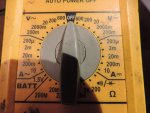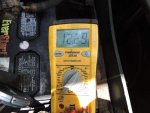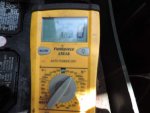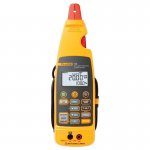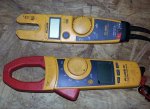Fluke is the only meter I will use...EVER. That are the best. I trust my life to them every day in the mill.
That being said the 179 is en excellent choice, and the one I carry daily at work. The 87v stays in the tool box until I need it. It has all the features of the 87v but a smaller package. Does Hz, has the diode check (Beeps when just checking continuity), does inline current up to 10 amps and a host of other features. But, it will not do current unless you get a separate amp clamp for it.
Now, I also have and use quite frequently, the 381 clampmeter. It is a bit more bulky, but will do everything you are wanting it to do. AC/DC volts, AC/DC amps up to 1000 amps, frequency, remote display for safe distance current measuring. A large current loop for excessively large wires, and will measure up to 2500 amps with the loop. Basically more than you'll ever use, and it is a bit spendy...but worth every penny!
The first one is the 179, the next one is the 381 and lastly the 87v.



